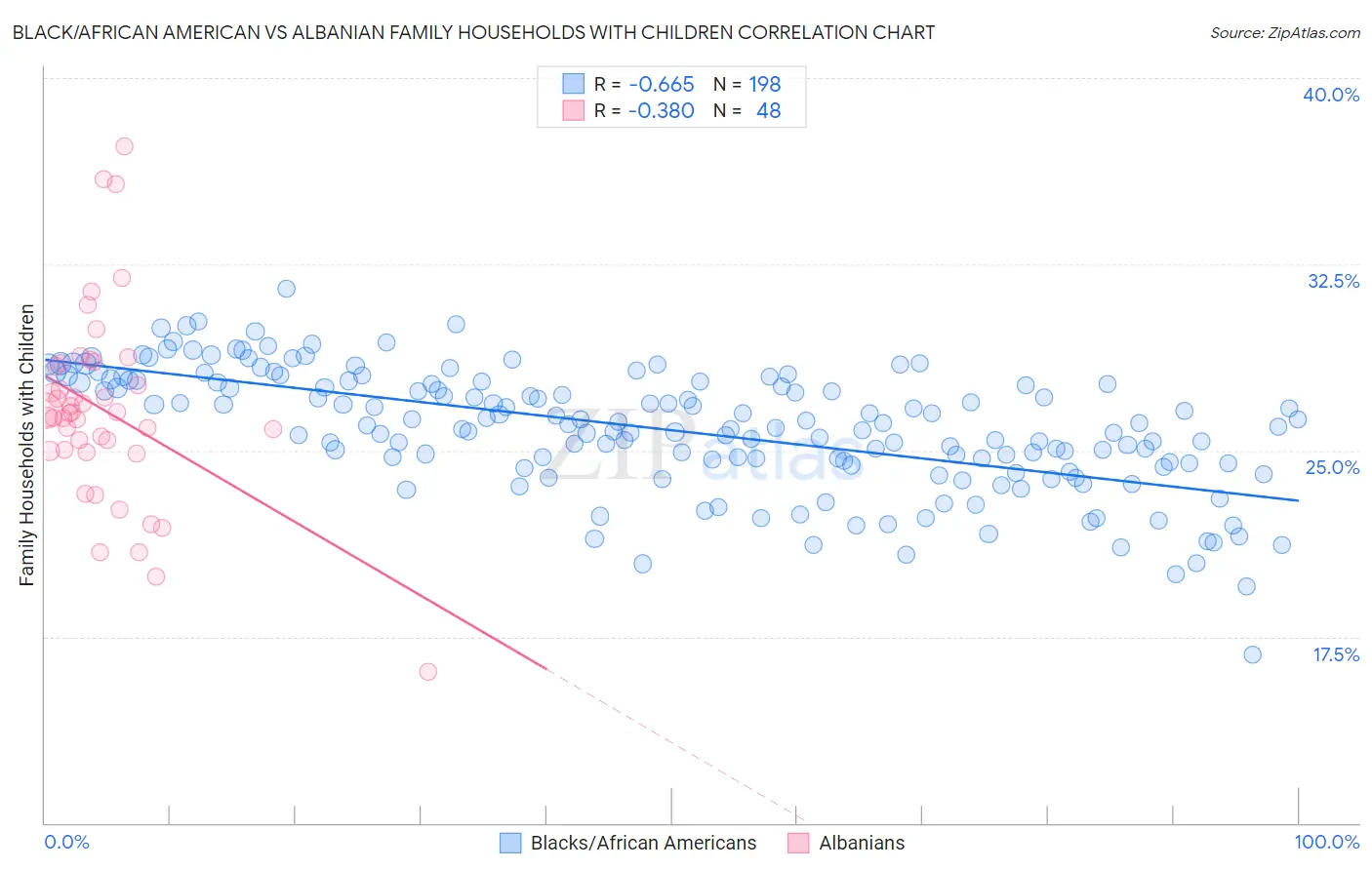Black/African American vs Albanian Family Households with Children
COMPARE
Black/African American
Albanian
Family Households with Children
Family Households with Children Comparison
Blacks/African Americans
Albanians
26.5%
FAMILY HOUSEHOLDS WITH CHILDREN
0.1/ 100
METRIC RATING
293rd/ 347
METRIC RANK
26.5%
FAMILY HOUSEHOLDS WITH CHILDREN
0.2/ 100
METRIC RATING
290th/ 347
METRIC RANK
Black/African American vs Albanian Family Households with Children Correlation Chart
The statistical analysis conducted on geographies consisting of 564,937,994 people shows a significant negative correlation between the proportion of Blacks/African Americans and percentage of family households with children in the United States with a correlation coefficient (R) of -0.665 and weighted average of 26.5%. Similarly, the statistical analysis conducted on geographies consisting of 193,166,642 people shows a mild negative correlation between the proportion of Albanians and percentage of family households with children in the United States with a correlation coefficient (R) of -0.380 and weighted average of 26.5%, a difference of 0.060%.

Family Households with Children Correlation Summary
| Measurement | Black/African American | Albanian |
| Minimum | 16.8% | 16.1% |
| Maximum | 31.5% | 37.3% |
| Range | 14.7% | 21.2% |
| Mean | 25.8% | 26.6% |
| Median | 26.0% | 26.5% |
| Interquartile 25% (IQ1) | 24.5% | 25.0% |
| Interquartile 75% (IQ3) | 27.7% | 28.4% |
| Interquartile Range (IQR) | 3.2% | 3.4% |
| Standard Deviation (Sample) | 2.5% | 3.9% |
| Standard Deviation (Population) | 2.4% | 3.8% |
Demographics Similar to Blacks/African Americans and Albanians by Family Households with Children
In terms of family households with children, the demographic groups most similar to Blacks/African Americans are Polish (26.5%, a difference of 0.050%), Bahamian (26.5%, a difference of 0.060%), Latvian (26.4%, a difference of 0.060%), Macedonian (26.4%, a difference of 0.13%), and Croatian (26.4%, a difference of 0.15%). Similarly, the demographic groups most similar to Albanians are Bahamian (26.5%, a difference of 0.010%), Polish (26.5%, a difference of 0.010%), Immigrants from Sweden (26.5%, a difference of 0.11%), Latvian (26.4%, a difference of 0.12%), and Russian (26.5%, a difference of 0.16%).
| Demographics | Rating | Rank | Family Households with Children |
| Lithuanians | 0.3 /100 | #281 | Tragic 26.6% |
| French American Indians | 0.3 /100 | #282 | Tragic 26.6% |
| Immigrants | North America | 0.3 /100 | #283 | Tragic 26.6% |
| Immigrants | Canada | 0.3 /100 | #284 | Tragic 26.5% |
| Cambodians | 0.2 /100 | #285 | Tragic 26.5% |
| Immigrants | Senegal | 0.2 /100 | #286 | Tragic 26.5% |
| Shoshone | 0.2 /100 | #287 | Tragic 26.5% |
| Russians | 0.2 /100 | #288 | Tragic 26.5% |
| Immigrants | Sweden | 0.2 /100 | #289 | Tragic 26.5% |
| Albanians | 0.2 /100 | #290 | Tragic 26.5% |
| Bahamians | 0.2 /100 | #291 | Tragic 26.5% |
| Poles | 0.2 /100 | #292 | Tragic 26.5% |
| Blacks/African Americans | 0.1 /100 | #293 | Tragic 26.5% |
| Latvians | 0.1 /100 | #294 | Tragic 26.4% |
| Macedonians | 0.1 /100 | #295 | Tragic 26.4% |
| Croatians | 0.1 /100 | #296 | Tragic 26.4% |
| Armenians | 0.1 /100 | #297 | Tragic 26.4% |
| Immigrants | Western Europe | 0.1 /100 | #298 | Tragic 26.4% |
| Trinidadians and Tobagonians | 0.1 /100 | #299 | Tragic 26.4% |
| Paiute | 0.1 /100 | #300 | Tragic 26.4% |
| Immigrants | Trinidad and Tobago | 0.1 /100 | #301 | Tragic 26.4% |